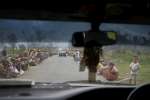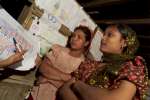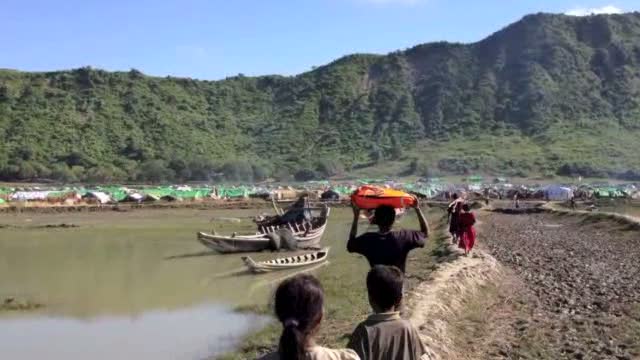UNHCR concerned about welfare of Kachins sent back from China
News Stories, 7 September 2012
BANGKOK, Thailand, September 7 (UNHCR) – The UN refugee agency said on Friday it was "seriously concerned" over reports that China has sent back groups of Myanmar nationals to insecure parts of Kachin state. "We estimate that some 5,000 ethnic Kachins – many of them children – have returned since mid-August and are living in makeshift camps [in northern Myanmar]," a UNHCR spokesman said.
These people had fled to China's Yunnan province after fighting broke out in June 2011 between Myanmar government troops and rebels in Kachin state. Despite repeated requests to the Chinese authorities, UNHCR has not been able to reach or assist these groups living along the Chinese side of the border.
"In mid-August this year, we started receiving reports of Kachins being sent back to Myanmar, but were unable to confirm as we could not access the border areas," spokesman Adrian Edwards said.
On the Myanmar side, a UNHCR team has travelled to Lwe Je near the Chinese border to provide aid and assess the needs of the returnees. Some of them say that the local authorities took down their shelters in China. Others report that plainclothes policemen put them on a truck, loaded their belongings on another truck, and drove them to a border crossing point. A local NGO saw what happened and arranged for trucks to take the returnees to the nearest camps in Myanmar.
More than 3,400 returnees are now staying in camps for internally displaced people in Kachin state as their homes have been destroyed in the fighting and they are afraid to return to their villages. "They desperately need food, medicine, shelter and other relief items," Edwards said.
UNHCR has so far distributed relief items to the 1,200 returnees in the four camps for internally displaced people in Lwe Je. These items include tarpaulin, blankets, mosquito nets, kitchen sets and basic toiletries. On Thursday, the UNHCR team completed their second visit to Lwe Je to deliver aid and assess the returnees' needs in a more comprehensive way.
Local groups and partners say they expect more people to be sent back from China. UNHCR is urging the government of China to offer temporary protection to those who fled the fighting, to respect their humanitarian needs and not send them back to a situation where their safety and livelihood could be at risk. UNHCR stands ready to support China in assisting these people until the situation stabilizes in their home areas.
The UN estimates that some 75,000 civilians have been displaced within Kachin and northern Shan states since fighting broke out in June 2011. More people continue to flee insecure areas every day.
















































